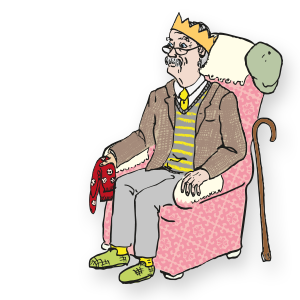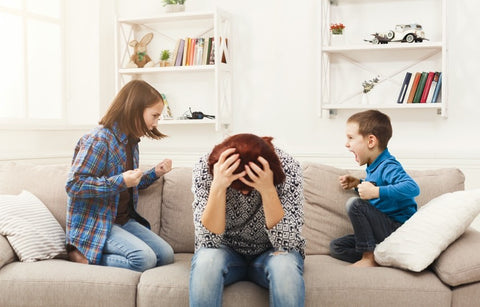

Children’s identity & feelings during lockdown

How to help them and still survive!
Written by Ollie Coach, Belinda Wells.
Identity and self-image are key to a child’s mental health and wellbeing. In fact, to our wellbeing as adults too. But with everything that is going on around us at the moment, it can be quite easy to begin to doubt who we are, where we stand or to let our feelings and emotions take control. It’s hard for children who are not able to go to school, not see their peers and friends and it’s difficult for us as adults too, if we are now forced not to work, or to work from home whilst looking after and even schooling our children!
Doing all this together in the same small space can create stress and anxiety.
We aren’t born with self-image or self-identity. It evolves over time based on our experiences. It can be influenced with changes in circumstances because children develop their sense of self from the environment they grow up in and through interactions with the people they live with. Having identity and a good self-image promotes a sense of belonging.
A supportive family who give a child emotional support will certainly increase the child’s overall health. So why is that so important now? Well, there are those of us – me included, who are actually enjoying this time at home with our families and our children! But many are anxious and confused!
And our children will pick up on this – no matter how well we think we are hiding it!

If family life is dominated by stress and conflict, the health of all the family members can be affected. This can result in lack of identity and can bring feelings of not belonging or of being an ‘outsider,’ feelings of worry, uncertainty and anxiety. Low mood, anxiety and poor self-image then lead to negative feelings and often it leads to frustration, anger, and despair.
So, what can we do?
There are things we can do. But first, remember that there are things that we can control and things that we can’t. So, if we concentrate on the things we can control, the things we can do something about, then this will help to lift our mood. Let’s look at some practical tips.
Belong from a distance
We all need to belong. Not only to our family, but to our community, for children to their school, however much they may tell us otherwise on normal school mornings! For us maybe we need to belong, be included, at work or with our friends and colleagues. And right now, these things are in some way being denied to us. This is what can make Self Isolation and Social Distancing so hard! Coupled with the uncertainty of the pandemic that surrounds us. It can steal our self-confidence and self-worth. If we let it!
Keep Connected Keep in touch
Teenagers in particular are influenced by their peers. They want to belong to a group, to be accepted. So, it’s really important that we let them keep in touch with their friends. Use social media groups, live calls so they can see each other. Perhaps encourage them to do some joint activities whilst chatting together too. Maybe an online make-up session with a friend, or a bit of online window shopping together on a teens clothing website.
Do it Virtually
Everything seems to be virtual at the moment doesn’t it. Perhaps your children could choose a film but share it with a group of friends and watch together virtually. Take part in an exercise class and chart progress together. Have a grow-a-plant competition, take photos and do a plant project. Younger children love this. Research or start a new hobby with a friend or set some activities for them to do before they talk next, to give them something to discuss when they do chat. Children will come up with ideas themselves if we allow them to chat with their friends, which will take the pressure off you.

Be Understanding.
We can engage with our children in ways that help them to trust and allow them to communicate their thoughts and feelings, but we must listen in a non-judgemental way. Listen to them. Understand how children may feel. How much should we tell our children about what is going on? Of course, they will need to know some things about the current situation, but too much detail can overwhelm and frighten them, so keep it to a minimum and age appropriate.
Resolve Arguments Fairly.
Yes, arguments will happen. But children do like parity and fairness. Often, we cannot get to the bottom of a situation, especially if we were not in the room. Try to listen to everyone without judging or jumping to conclusions. Perhaps have a family meeting where only one person is allowed to speak at any one time, so everyone gets a chance to be heard. A good way to do this is to pass a wooden spoon around and only the person holding the spoon can talk. But you may have to set a time limit – then let someone else have a go! This is a really useful way of resolving arguments and allowing everyone to be heard but to hear what others think and feel too. Then you can allow them to come up with ideas for the solution. This includes them and also gives them some control. And if they come up with any consequences or solutions, they will take ownership of it and it will work.
Encourage.
Encourage children to develop new interests. Try to spot spontaneous learning opportunities wherever we can as this will help children or young people to identify their own strengths and abilities. Look for the positives and opportunities for a new hobby or pastime. Learn something you wouldn’t have been able to do before. Don’t worry about screen time limits – but let them learn some new things that don’t feel like this lockdown is just school at home! Life skills after all are just as important. So, when you have the time interact with them, go out and look at nature if you can. Walk together, look for signs of Spring.

Create opportunities for growth.
Children gain self-confidence and self- esteem when allowed to help in making decisions. Children- and probably adults too at the moment - feel that they aren’t in control of what is happening. We can’t be in control. We can’t change what is happening. But we can change the way we feel about it and the way we react. It really helps if we can involve children. Their wishes and feelings are important. Accepting responsibility for their actions and being rewarded for their efforts and achievements helps with their identity and self-image too which will have a positive impact on their behaviour.
Stay Grounded.
If we let our children see that we are calm, then they will follow suit. If we let them see that we are anxious, then they will feel anxious too. So, take time to make sure you are looking after yourself. Find ways to keep yourself grounded and relaxed. Sign up to an “Ollie Chillout Session” on your own or as a family. Try Breathing or Grounding techniques to help you. A good game is to pretend you are a tree.

Stand up straight with your branches out and breath in the air. As you do so, allow your breath to travel slowly down through your body, through your feet and into your roots. You may begin to feel that your legs or feet feel heavy. Keep your feet still and allow your body to sway. Keep your feet connected to your roots and allow them to hold you to the ground. When you have done this for a few moments try to lift one of your feet slowly and balance on one leg. Put it slowly down and then do the same with the other. And when you are ready allow your roots to let you go. You will now feel much calmer and more grounded. Try it and see.
We can all feel good about who we are and how we feel, in spite of our circumstances. It may just involve a new way of thinking and a bit of taking back control!
Belinda Wells, Ollie Coach
Belinda is an Ollie Coach and Foster Carer. Previously a Primary School Teacher, she now has over 20 years’ experience working with children. Her interests are psychology, how we think and why we behave as we do, and she loves learning and writing. Belinda enjoys seeing the difference her work as an Ollie Coach can make to the children and families she works with.
To get in contact with Belinda email Belinda.wells@ollieandhissuperpowers.com

